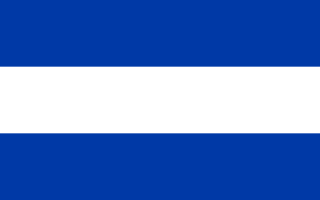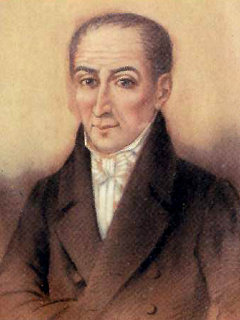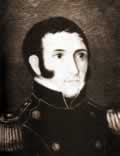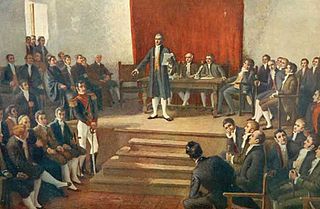External links
- La Aurora de Chile, First Chilean Newspaper (1812) online. (in Spanish)
- Monograph (in Spanish)
Government Junta of Chile (August 10, 1811), also known as the Executive Junta or the Second Government Junta, was the organ established to rule Chile following the convocatory of a National Congress.
After the convocatory of a National Congress on July 4, 1811, the president of the First Junta resigned all the executive powers on the Congress and proceeded to dissolve the Junta. So, from that date until August 10 the sum of all political powers was concentrated in that body.
| Position | Name |
|---|---|
| Members | Colonel Martín Calvo Encalada Juan José Aldunate Francisco Javier del Solar |
| Alternate Member | Juan Miguel Benavente |
| Assistant | José Antonio Astorga |
| Secretary | Colonel Manuel Joaquín de Valdivieso |
The Junta assumed the executive powers by dictate of the National Congress, but soon thereafter Juan Martínez de Rozas decided to challenge its powers and resume his leadership of the revolutionary movement. The Junta lasted only just a little over 3 weeks. On September 4, 1811, in a bloodless coup, the Junta was forced to resign and be replaced by the Superior Junta.

The Argentine War of Independence was a secessionist civil war fought from 1810 to 1818 by Argentine patriotic forces under Manuel Belgrano, Juan José Castelli and José de San Martín against royalist forces loyal to the Spanish crown. On July 9, 1816, an assembly met in San Miguel de Tucumán, declaring independence with provisions for a national constitution.


The National Congress of Chile is the legislative branch of the government of the Republic of Chile.

Fernando de Errázuriz y Martínez de Aldunate, also known as Fernando Errázuriz Aldunate, was a Chilean political figure. He served as provisional president of Chile in 1831.

The United Provinces of the Río de la Plata, earlier known as the United Provinces of South America, was a name adopted in 1816 by the Congress of Tucumán for the region of South America that declared independence in 1816, with the Sovereign Congress taking place in 1813, during the Argentine War of Independence (1810–1818) that began with the May Revolution in 1810. It originally comprised rebellious territories of the former Spanish Viceroyalty of the Río de la Plata dependencies and had Buenos Aires as its capital.

The First Republic of Venezuela was the first independent government of Venezuela, lasting from 5 July 1811, to 25 July 1812. The period of the First Republic began with the overthrow of the Spanish colonial authorities and the establishment of the Junta Suprema de Caracas on 19 April 1810, initiating the Venezuelan War of Independence, and ended with the surrender of the republican forces to the Spanish Captain Domingo de Monteverde. The congress of Venezuela declared the nation's independence on 5 July 1811, and later wrote a constitution for it. In doing so, Venezuela is notable for being the first Spanish American colony to declare its independence.

The First Republic of New Granada, known despectively as the Foolish Fatherland, is the period in the history of Colombia immediately following the declaration of independence from Spain in 1810 and until the Spanish reconquest in 1816. The period between 1810 and 1816 in the Viceroyalty of New Granada was marked by such intense conflicts over the nature of the new government or governments that it became known as la Patria Boba. Constant fighting between federalists and centralists gave rise to a prolonged period of instability that eventually favored Spanish reconquest. Similar developments can be seen at the same time in the United Provinces of the Río de la Plata. Each province, and even some cities, set up its own autonomous junta, which declared themselves sovereign from each other.

The Chilean War of Independence was a military and political event that allowed the emancipation of Chile from the Spanish Monarchy, ending the colonial period and initiating the formation of an independent republic.

Juan José Esteban Paso, was an Argentine politician who participated in the events that started the Argentine War of Independence known as May Revolution of 1810.

The Government Junta of Chile was the military junta established to rule Chile during the military dictatorship that followed the overthrow of President Salvador Allende in the 1973 Chilean coup d'état. The Government Junta was the executive and legislative branch of government until December 17, 1974, when Augusto Pinochet rose was formally declared President of Chile in late 1974. After that date, it functioned strictly as a legislative body until the return to democracy in 1990.

Government Assembly of the Kingdom of Chile, also known as the First Government Gathering, was the organization established to rule post-colonial Chile following the deposition and imprisonment of King Ferdinand VII of Spain by Napoleon Bonaparte. It was the earliest step in the Chilean struggle for independence, and the anniversary of its establishment is celebrated as the national day of Chile.

José Miguel Pey y García de Andrade was a Colombian statesman and soldier and a leader of the independence movement from Spain. He is considered the first vice president and first president of Colombia. He was a centralist.

The Socialist Republic of Chile was a short-lived political entity in Chile, that was proclaimed by the Government Junta that took over that year.
The Figueroa mutiny was a failed attempt on April 1, 1811 to restore royal power in Chile and the first coup d'état in Chile.

Martín Calvo de Encalada y Recabarren was a Chilean politician who participated as a member of Congress during the Chilean War of Independence.

The president of the Chamber of Deputies of Chile is the highest authority of the Chamber of Deputies of Chile. The office was established in 1811 by the First National Congress of Chile.
The following lists events that happened during 1811 in Chile.
The history of the Constitution of Chile dates from 1811. There were 10 constitutional texts and a draft for a federal organization in 1826. Its common elements are the unitary form of state and presidentialism as a form of government.

The First Chilean National Congress was the first legislative body established in Chile. It was inaugurated on July 4, 1811, being one of the oldest congresses in Latin America. It was convened to decide the best kind of government for the Kingdom of Chile during the captivity of King Ferdinand VII in the hands of Napoleon. It was in session from July 4 until December 2, when it was dissolved by a coup d'état by General José Miguel Carrera.